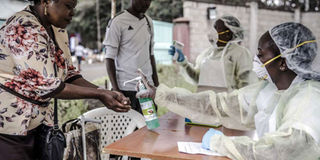In battle against Covid-19, healthcare workers risking it all

Our medical healthworkers may be trained to deal with the enemy, but they may not feel prepared. PHOTO | FILE | NATION MEDIA GROUP
It is the last day of a very tough month for Kenya. March 2020 will go down in the annals of our history as the month that heralded the entry of the deadly virus into our borders.
As a country, we have gone through drastic adjustments in the past few weeks, with the sudden realisation of just how much we take for granted that has been wiped away with a single diagnosis.
We are struggling to contain the tide of a pandemic amid a crumbling economy yet the two cannot exist in isolation. As the government continues to tighten conditions for Kenyans in an effort to protect us, we remain duty-bound to put aside our personal opinions and comply with the restrictions because the impact of the pandemic is not individualised.
The term “flattening the curve” has been thrown around and may sound so bourgeois, but it is the very thread by which we hang. This is best demonstrated by taking a stroll through our recent history of an epidemic that left the world shaken yet its magnitude was no- where close to what we see today, the Ebola outbreak of 2014 to 2016.
According to the World Health Organization, the outbreak resulted in 11,310 deaths. It is estimated that at least 600 healthcare workers succumbed to Ebola in the line of duty. Dr Ameyo Adadevoh epitomised the real sacrifice that healthcare workers have to make when faced with excruciatingly difficult situa- tions. She single-handedly stood between Ebola and a 170 million-strong Nigeria. Together with eight other healthcare workers in her private hospital in Nigeria, she paid the ultimate price of death to save her country from Ebola when she diagnosed patient zero, Mr Patrick Sawyer and forcibly quarantined him at the expense of her life. This she did stoically in at the risk of creating a diplomatic crisis between Liberia and Nigeria by refusing to release the patient.
The December edition of the Lancet, volume 384, issue 9961, honoured the men and women of valour who died in the trenches battling the Ebola outbreak. These 12 men and women were described by their colleagues as being deeply dedicated to their work and their selfless commitment to serving humanity. We are at a crossroads as a country. We have declared war against Covid-19. We have sent our troops to the battleground, armed with medical knowledge and big hearts. They are driven by the commitment they made when they took the Hippocratic Oath or the Nightingale Creed. They may be trained to deal with the enemy, but they may not feel prepared. Do our doctors, nurses, clinical officers, laboratory technologists and all other health workers feel safe? Not at all. To say they do would be lying. What they are doing is conquering their fears and marching on anyway. They cannot afford to run because there won’t be anybody left. Our healthcare workers are no different from the thousands who have succumbed across the world. President Uhuru Kenyatta has repeatedly thanked the healthcare workers for the sacrifice they are making to fight for those affected. This is important in keeping the spirits of our troops up. They know they are going into the red zone, but they have the insight to appreciate that they do not truly know just how bad things are really going to get. We have heard from our colleagues in China who have worked straight six-hour shifts without bathroom breaks. They have had to wear adult diapers because there is no way to get out of your personal protective equipment to honour a call of nature amid the chaos. They have gone long hours without a meal because there is no way to eat inside the work area. We have seen pictures of bruised faces from long hours in face masks.
The struggle no one is talking about is the psychological one. This is both professional and personal. In the US, for instance, hospitals are designing protocols on how to prioritise patients so as not to get overwhelmed like in the case of Italy. Some of the decisions that require to be taken are absolutely cold. For instance, who gets on the last ventilator when you have two patients equally in need? It is coming down to something as basic as having to toss a coin. How does the doctor sleep at night knowing that there was noth- ing they could do to help in that instant? How does the nurse avoid nightmares knowing she had to remove the 35-year-old mother of two from the ventilator so that the 27-year-old mechanic could get on because he had a better chance of recovery? The personal struggle is even worse. The young, pregnant physiotherapist who is worried about her own unborn baby yet all the ICU patients desperately need her to administer chest physiotherapy to keep them alive. Or the breast
- feeding anaesthesiologist who’s full breasts are leaking into her protective suit, but she is so swamped she only notices this when she is changing to go home. If you have never suffered breast engorgement, you have no idea how painful it is. She also lives in fear of the risk she carries home to her baby every evening.
The struggle is real for these soldiers. We cannot even begin to understand what it means to stand in the firing line to protect our fellow countrymen. The support needed is immense, especially when it begins to look like we are not doing enough. The kind word, the prayer, the thumbs up, the smile, it means the world to the troops. The least we can do is to heed all they have asked: “We have to stay at work for you, please stay at home for us.”
Dr Bosire is an obstetrician/gynaecologist


